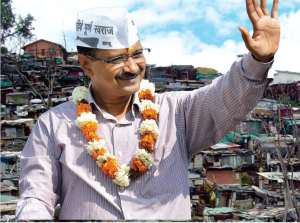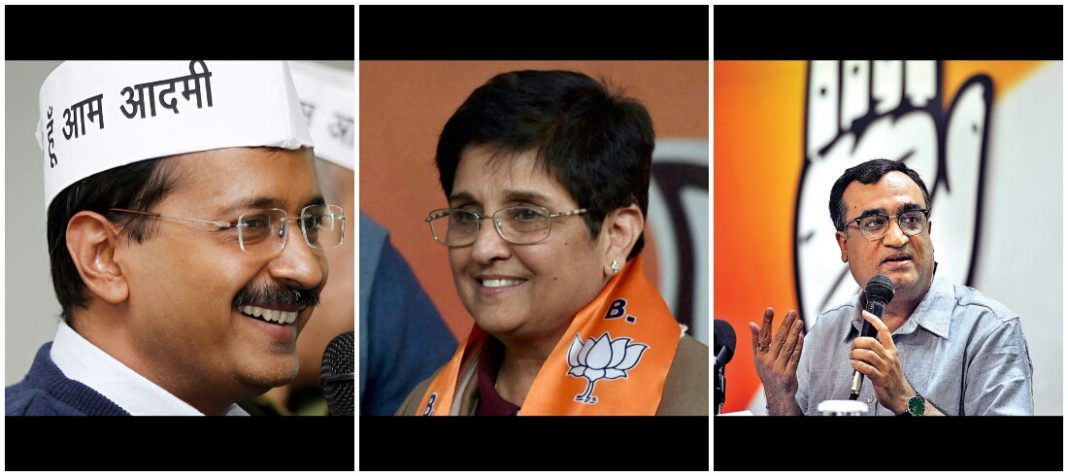Top Stories
Delhi Slum Regularisation: A Tough Task




Having ascended the ‘Delhi throne’ with a brute majority in the Assembly elections, the Aam Aadmi Party Government of Arvind Kejriwal has got on with the job in right earnest. Pre-poll promises are aplenty, the task is humongous and people’s expectations are sky-high. Thankfully, the Chief Minister is now wiser with experience and seems intent on providing efficient governance to the national Capital, shorn of gimmicks and theatrics of his 49-day rule in early 2014.
Just 11 days into power, the Government fulfilled two major campaign promises halving power tariff for consumption up to 400 units a month and announcing t hat 20,000 litres of water would be supplied free to every household in Delhi. According to Government’s claim, the power subsidy would cover some 36 lakh households and around 13 lakh families would benefit from the free water scheme. The two subsidies put together will total nearly Rs 1, 700 crore a year. Earlier, after its very first Cabinet meeting, the Government announced another important decision of banning demolitions in the national Capital, saying, it wants to “take a holistic view on the of icy of demolitions in residential areas and urns” It’s another matter the land in Delhi doesn’t come under the purview of the Delhi Government.
So far, so good! The Government is on the right track, the numbers in the Assembly are no issue and Five year innings is guaranteed. Among the plethora of issues on the platter, the two which may prove to be tough tasks for Kejriwal and have all the potential of hitting major bottlenecks are the AAP’s promise of regularisation of unauhorised colonies and its focus on EWS {economically weaker section) housing in Delhi.
Since these are also precisely t he issues impacting the real estate sector directly, Realty & More decided to have a close look on these incorporating the perspective of some eminent developers in Delhi-NCR. In its election manifesto titled Delhi Dialogue, the Aam Aadmi Party has said “Within one year of forming the Government unauthorised colonies will be regularised and residents given ownership rights. Two aspects need to taken into account here: is blanket regularisation of 1,939 unauthorised colonies in the Capital possible or should it be decided on a case-by-case basis? Since Delhi has a three-tier governance system, does it not throw a huge challenge before the Kejriwal Government?
Yes, it does, but AAP is quite confident of handling it. Deepak Bajpai, spokesperson of the party, told Realty & More, “Since both the BJP and the Congress have also talked about regularisation in their manifestos that shows there is clear consensus on this issue. We don’t want any confrontation and are quite confident that the BJP Government at the Centre will support us on this.”
• The Government is on the right track, the numbers in the Assembly are no issue and five-year innings is guaranteed. But among the plethora of issues on the platter, the two which may prove to be tough tasks for Kejriwal and have all the potential of hitting major bottlenecks are the AAP’s promise of regularisation of unauhorised colonies and its focus on EWS housing.
• Old colonies are redeveloped and given back to people living there. Additional units are sold at market rates to generate revenue and make the redevelopment project viable. In situ development involves the Government providing basic facilities like water sewage connections on the site itself and then regularising the colonies by giving occupants ownership rights through an official gazette notification.
Bajpai said till now regularisation of unauthorised colonies has only been a poll issue. “You talk about it and then just walk away… Sheila Dikshit issued certificates which turned out to a scam. The BJP made a notification and said regularised!” he scoffed and emphaised, “We will make regularisation a reality.” He said, “We are committed and we don’t see any roadblocks from any quarters.” Moreover, “the kind of mandate we have will force the Centre to fall in line and support us,” he said.


DEEPAK BAJPAI, Spokesperson, AAP
Asked about the timeline, the AAP spokesperson was quick to add, “We are not drawing any timeline for any project. We have
a five-year mandate. The things which can be done by executive order will be done by executive order. And done fast! Some work which we have to do by legislative order will be done by legislation”.
Bajpai said, “Nobody needs to be insecure. We are committed and whatever we have promised will happen. Housing for poor is
one of the priorities for the Government. For that, we are already talking to experts on lowcost housing and cost-analysis etc”. Asked if the party foresees any bottlenecks since for EWS housing and regularisation it will have to work closely with DDA, which comes under the Central Government, and the three municipal corporations, Bajpai answered with a firm “No”. He said, “They also talk about the same issues like welfare of people and low-cost housing which we are talking.
So, I don’t see a reason that BJP will back.” Urban planners, quoted in various media reports say the colonies can be regularised either through redevelopment or in site development models and only a format suited to an individual colony should be implemented. According to Amit Bhatt, strategy head, Embarq India, regularisation can be done through the redevelopment model followed in Mumbai. Old colonies are redeveloped and given back to people living there. Additional units are sold at market rates to generate revenue and make the redevelopment project viable. In situ development involves the Government providing basic facilities like water and sewage connections on the site itself and then regularising the colonies by giving occupants ownership rights through an official gazette notification.
The AAP Government will have to take a hard look at these colonies and see which model best suits them. There may be some areas where structural safety is a big issue and redevelopment the only solution, Bhatt adds.










Service provision and land use changes can also pose major challenges before the Government. Land use change is essential as most of these unauthorised colonies are agricultural in nature and they need to be first converted to residential. Given the three-tier character of governance system in the Capital, it will be no cakewalk for Kejriwal. Delhi Development Authority (DDA), which comes under the Union Government, is in charge of the land use change in the city, the MCDs are mandated to approve the layout plans and the entire process needs to be coordinated by the Government of National Capital Territory of Delhi (GNCTD).


The other AAP promise of providing EWS housing and help in removing bottlenecks in land acquisition for such construction is also no mean challenge but the real estate industry has vowed to aid the efforts for housing needs in Delhi as it views this as an opportunity to strike a chord with the city running out of space. Rohit Raj Modi, President of Credai-NCR, was quoted in the media as saying, “Looking at the strong mandate given by the people of Delhi, we are very optimistic about the reforms and changes this
Government would bring in to improve the overall growth in the national Capital. Going by the manifesto of AAP, we expect the party to focus on providing EWS housing. We, through Credai-NCR, extend our whole-hearted support to the new Government in making Delhi a world-class city.” Prashant Tiwari, Chairman of Prateek Group and Vice-President of Credai-NCR, said, “The first challenge, as rightly underlined in the manifesto, will be to address the hold-up that industry faces in land acquisition. The Government will need to identify corridors within the city to make land available to meet needs of EWS.” While lending full support to the Kejriwal Government on its major promises that have a long-term bearing on realty sector, the industry has not stopped from voicing fears because of the prevailing ground reality. As Anuj Goel, Executive
Director of KDP Infrastructure, put it, “Delhi being a Union Territory, AAP Government will have to work together with the Central Government led by BJP to fulfill promises of regularisation of colonies.” As for providing EWS housing, he told Realty & More, “The Government will require land and money and for both it will have to work in tandem with the Central Government.” He summed it up by saying, “We are hopeful that both will work together for the development of Delhi and welfare of its residents.”


Striking a realistic note, Ashok Gupta, CMD of Ajnara India Ltd., said, ‘Two of the very important concerns of the party, i.e. housing for economically weaker sections and regularisation of unauthorised colonies are the need of hour in an overcrowded Delhi. Although, these are early stages and similar assurances have been given before as well, if the state Government and authorities cooperate well, then this will no longer be a dream for people.” Consequently, he said, “The real estate of Delhi will see a better demand and growth over the next five years. Going to the origin of the problem, Kushagr Ansa I, Director, Ansal Housing, said, “The reason why these unauthorised colonies came up was because there was a lack of affordable housing or lack of Government housing in Delhi from the very beginning.” It is well-known fact, he said, “The DDA did not meet its targets of LIG, MIG and EWS housing.
• AAP promise of providing EWS housing and help in removing bottlenecks in land acquisition for such construction is also no mean challenge but the real estate industry has vowed to aid the efforts for housing needs in Delhi as it views this as an opportunity to strike a chord with the city running out of space.
• While lending full support to the Kejriwal Government on its major promises that have a long-term bearing on realty sector, the industry has not stopped from voicing fears because of the prevailing ground reality.
But Delhi as a city kept growing which is one of the big reasons why these colonies came up in the first place.” Sounding a note of optimism, Ansal said, “Now, the new Government has a definite plan to regula rise these colonies and come up with more EWS housing for the people.” This, he said, would reshape the real estate sector of Delhi which has been underperforming for several years now. Summing up with the commonly-expressed apprehension, he said, “This is a steep task and will require support of DDA and other municipal corporations.
The AAP Government has these five years within which it’ll need to prove its mettle.” Perhaps, the most optimistic about the entire issue is Ravi Saund, COO of JMS Buildtech, who told Realty & More, “Indeed there is a huge scope for regularising unauthorised colonies which comes with the biggest challenge to streamline it with urban planning.” Policies pertaining to floor space index and land pooling Act would play an intrinsic role in redevelopment of unauthorised colonies, he said, adding, “Development of these unauthorised colonies which are unsystematic, unhygienic and languish in basic amenities should be the main objective legal viability which stands of as a far cry as of now.
-



 News3 weeks ago
News3 weeks agoKW Delhi 6 Mall Onboards New Brands
-



 News3 weeks ago
News3 weeks agoManasum Senior Living Launches IKIGAI GOA, A Senior Living Community in North Goa, in collaboration with Prescon Homes
-



 News2 weeks ago
News2 weeks agoGodrej Properties Sells Rs 3k cr+ Homes of Godrej Zenith, Gurugram, within 3 days
-



 News3 weeks ago
News3 weeks agoBridging India Divide: Top 5 Tier- 2 Cities to Focus On
-



 News3 weeks ago
News3 weeks agoCommercial Realty Gets Tech Savvy: Fast Construction, Enhanced Convenience
-



 News3 weeks ago
News3 weeks agoMultipoint Connection – A Definite Boon
-



 News2 weeks ago
News2 weeks agoRBI’s Status Quo on Key Policy Rates to Help Maintain the Real Estate Growth Momentum, Say Industry Stalwarts
-



 News3 weeks ago
News3 weeks agoSacred Cities See a Retail Boom as Spiritual Tourism Surge: CBRE Report



















